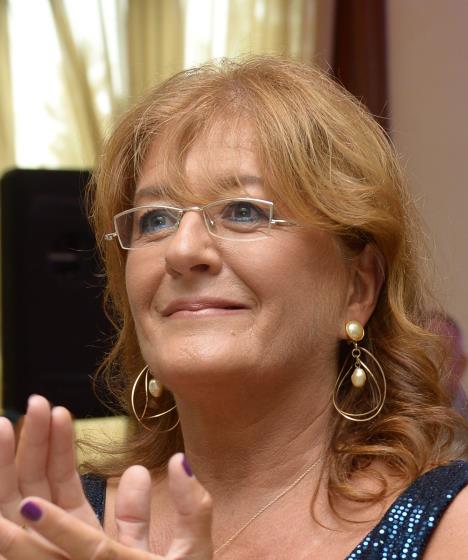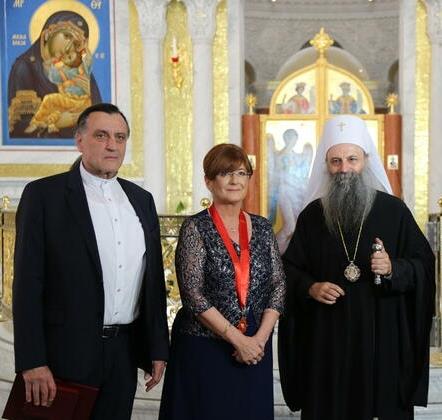Dr Nadežda Basara: ‘I've Treated Over 50,000 Patients, But I Haven't Had the Chance to Parachute Jump’

Belgrade-born Professor Nadežda Basara, PhD, is the most recognised haematologist, oncologist, and stem cell transplant specialist from Southeast Europe in the world. She has treated over 50,000 oncology and haematology patients and has performed stem cell transplants on 2,500 of them. For her achievements, she has received the highest international recognitions. However, she says she hasn't had the chance to parachute jump, which was a great desire of hers
Until 1997, she was a department head at the University Clinical Centre in Belgrade, and since 1997, she has been working in Germany. For the past 13 years, as Director of Internal Medicine at the Malteser St. Franziskus Hospital in Flensburg, she has found ways to treat many people from these regions in this institution, foregoing her managerial bonus.
The success rate of returning patients to normal life two years after transplantation over the last 12 years under Dr Basara is as high as 88%. This places her at the very top globally according to statistics. Dr Basarais also a visiting professor at the universities in Belgrade and Niš, and since June last year, she has been treating patients at a private clinic in Montenegro.
"Since June last year, I have been working at the first and oldest private polyclinic in Podgorica, which has existed and successfully operated for over 30 years. For my patients from the Balkan countries, it is much simpler to come to Podgorica than to travel to Germany. It is also easier for new patients from neighbouring countries, including Serbia, who want a consultation and advice on their illness and treatment, as Podgorica is close. For those who cannot come, they send requests for a professional opinion via email through the Polyclinic, which they receive promptly.".
Is there a higher incidence of oncology and haematology diseases in these regions compared to Western Europe?
"It is incorrect that there is a higher incidence of oncology and haematology diseases in the Balkans compared to Western Europe. In Germany and other Western European countries, there are registries of malignant diseases, and patient registration is legally regulated in an anonymised form. This means that all oncology and haematology centres, i.e., all clinics dealing with the treatment of malignant diseases, are obliged to report patients to the registry. The statistics are accurate, and in Germany, about 500,000 new patients with malignant diseases are diagnosed annually, which represents about 0.6% of the total population. In Serbia and neighbouring Balkan countries, the incidence of malignant diseases is similar."
What exactly does targeted therapy in the treatment of haematology and oncology patients, which you use, entail? Why is it called the therapy of the future?
"Targeted therapy involves the use of drugs that act on malignant cells by binding to these cells and killing them. However, this therapy can only be applied to diseases where cells have a 'target' that the targeted therapy can act upon. A classic example is chronic myeloid leukaemia, which has BCR-ABL and the drug from the tyrosine kinase inhibitor group, Iimatinib, which has been used to treat this leukaemia since 2000. Another example is advanced lung cancer, which shows an EGFR receptor mutation, and the drug Osimertinib, which is used in the treatment of EGFR-mutated lung cancer. Since 2021 in Germany, it has been legally regulated that every oncology and haematology patient has the right to genetic testing by the so-called NGS method, which is very precise, and health insurance is obliged to cover the costs of this testing. In Serbia, patients still pay for this themselves in private laboratories that send the analysis abroad.".

Do you have data on how many patients you have cured when it seemed unlikely?
"I haven't kept statistics, but I can give you data for Hodgkin's lymphoma patients, of whom I have cured 80%, and they are all alive, healthy, and active today. Another example is stage IIIB and IIIC advanced lung cancer patients, where I have achieved a cure in over 50% of patients with combined cytostatic and radiation therapy, as well as maintenance immunotherapy."
What does that feel like?
"It is, of course, an extraordinary feeling because these are advanced stages of disease where such a good result is not initially expected in the treatment. Every cured patient gives me the strength to apply optimal individual therapy, designed specifically for that patient, to many more patients.".
When was it most difficult for you during your stay in Germany and why?
"It was most difficult at the very beginning in 1997. We did not know the social and educational system in Germany at all, and that year it was most important for us to learn German well, especially for our son and daughter to fit into the school system. Additionally, I was learning the method of haematopoietic stem cell transplantation and oncology because in Germany, subspecialisations in haematology and oncology are combined into one field, haemato-oncology. During that period, the advice of friends we made through our children's activities was of great help."
What are the basic differences, apart from those to do with the salary difference, between being a doctor in Germany and doing the same job in Serbia?
"The basic difference is that, as a doctor in specialisation in Germany, you need to fulfil an entire catalogue of various skills by numbers, which is not just something on paper, but it is also controlled. No one gets a signature and a characteristic without fulfilling the catalogue. So, specialisation, for example, in internal medicine, can last at least five years, but also much longer if you have not fulfilled all the skills provided in the catalogue. When a doctor completes specialisation, they decide either to stay in the hospital or go into private practice; there is no possibility of doing both. Additionally, it is known that the patient is the most important in the health system, and the processes in hospitals and private practices are planned in such a way that the patient waits as little as possible, quick and rational diagnostics are conducted, the condition of each patient is presented to an interdisciplinary team of doctors, and the patient gains confidence in their doctor. And, of course, all procedures and analyses are paid for by health insurance, not the patient personally, as is currently the situation in Serbia."
What are you most proud of in your rich career?
"I am most proud of the success of my whole family because my career would mean nothing if the family had been neglected because of it. Fortunately, that didn't happen, and the children and their partners and our grandchildren have become not only good people but also experts in their fields.".
You have done a lot, you have a successful career and a family you are very proud of. Is there still a wish that has remained unfulfilled?
"To parachute jump once. Unfortunately, that wish will remain unfulfilled because, at my age, it is not done, and when I might have been able to, I didn't have time."
The first woman and doctor in the history of the Serbian Orthodox Church to receive the highest decoration
Patriarch Porfirije awarded Dr Basara with the highest order - the Order of St. Sava, second grade, for humanity and the treatment of Serbian patients on behalf of the Serbian Orthodox Church three years ago.It was the first time in the history of the Serbian Orthodox Church that a woman and a doctor received the highest church decoration.

She is married to Branislav, an engineer, who, besides his regular job, still performs PR functions even in retirement. They have two children, Vukašin and Miljana, and three grandchildren..
Reproduction of part or the entire text and/or photo/video is prohibited without citing and linking the source and author, in accordance with the WMG Terms of Use and the provisions of the Law on Public Information and Media.








































"POBEDIĆEMO U ZAJEČARU I KOSJERIĆU" Predsednik Vučić: Nikada neću dozvoliti neradnicima, lenčugama i kriminalcima da unište Srbiju